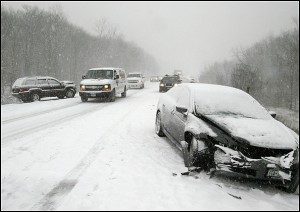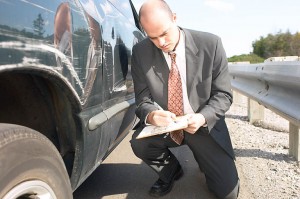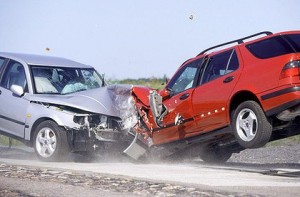 It’s that magical time of year when people are traveling to be with one another in spite of all weather condition. Unfortunately with freezing temperatures, it is somewhat hard to tell the difference between black ice and water on the road. Being prepared for these driving conditions can help you stay safe this holiday season. Here are some winter driving tips to help you prevent a car accident.
It’s that magical time of year when people are traveling to be with one another in spite of all weather condition. Unfortunately with freezing temperatures, it is somewhat hard to tell the difference between black ice and water on the road. Being prepared for these driving conditions can help you stay safe this holiday season. Here are some winter driving tips to help you prevent a car accident.
1. Loose Steering – When the front wheels begin to lose traction it is sometimes an instinct to jerk the wheel back, however letting go of the steering temporarily is the easiest way to get control of the car while shifting to neutral and slowly guiding the wheels back in the direction you want to go.
2. Ease Brakes – Do not pump your breaks. You will need to brake gently at all times so that your wheels do not lock up. This will prevent you from skidding and sliding off the road.
3. Use Headlights – Keep your headlights clean and shiny so you can be seen easily. It is important to keep them on even during daylight.
4. Avoid Night Driving – Night driving is much more challenging with snow and ice. Try only driving when there is plenty of natural light.
5. Slow Down on Bridges – Bridges and overpasses will be the first to freeze when temperatures drop. Slow down when approaching them and lightly tap your breaks to notify other drivers that your speed is decreasing. High speeds can lead to a vehicle spin.
6. Look Ahead – You will need to double your visibility range for extra reaction time. If visibility is bad, then slow down.
Plan for what is ahead. Snow plows, sand trucks and other road maintenance vehicles are difficult to maneuver and may decrease your visibility. Keep your distance and be cautious when approaching them.
7. Be Defensive – Practice getting control of your car after you skid in an empty and clear parking lot during non-driving hours to become more skilled.
If you are involved in an auto collision, it is best to stay in your vehicle and wait for help to arrive. Getting out will put you at risk of being hit by another vehicle. If you suffer any injuries in the collision, call an ambulance to seek treatments for your injuries or if an ambulance is not required make sure to seek medical attention as soon as possible within the first 24 – 48 hours after the accident.



 You Deserve an Advocate
You Deserve an Advocate